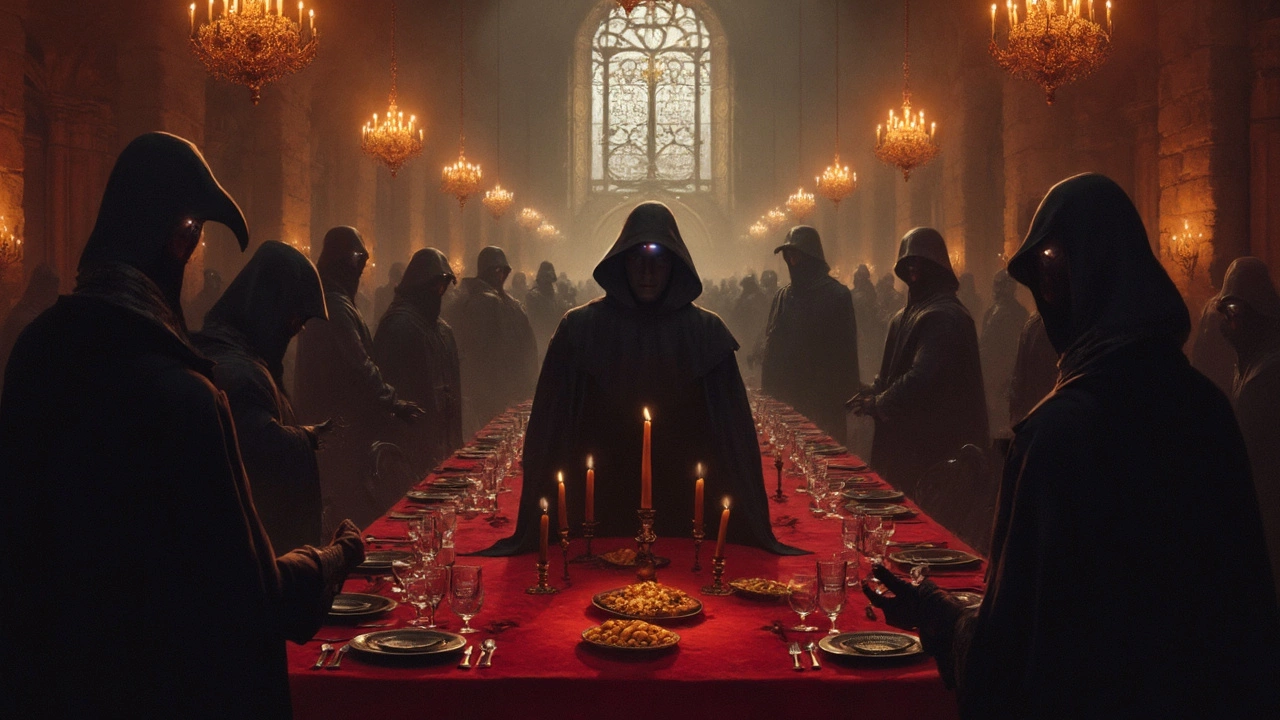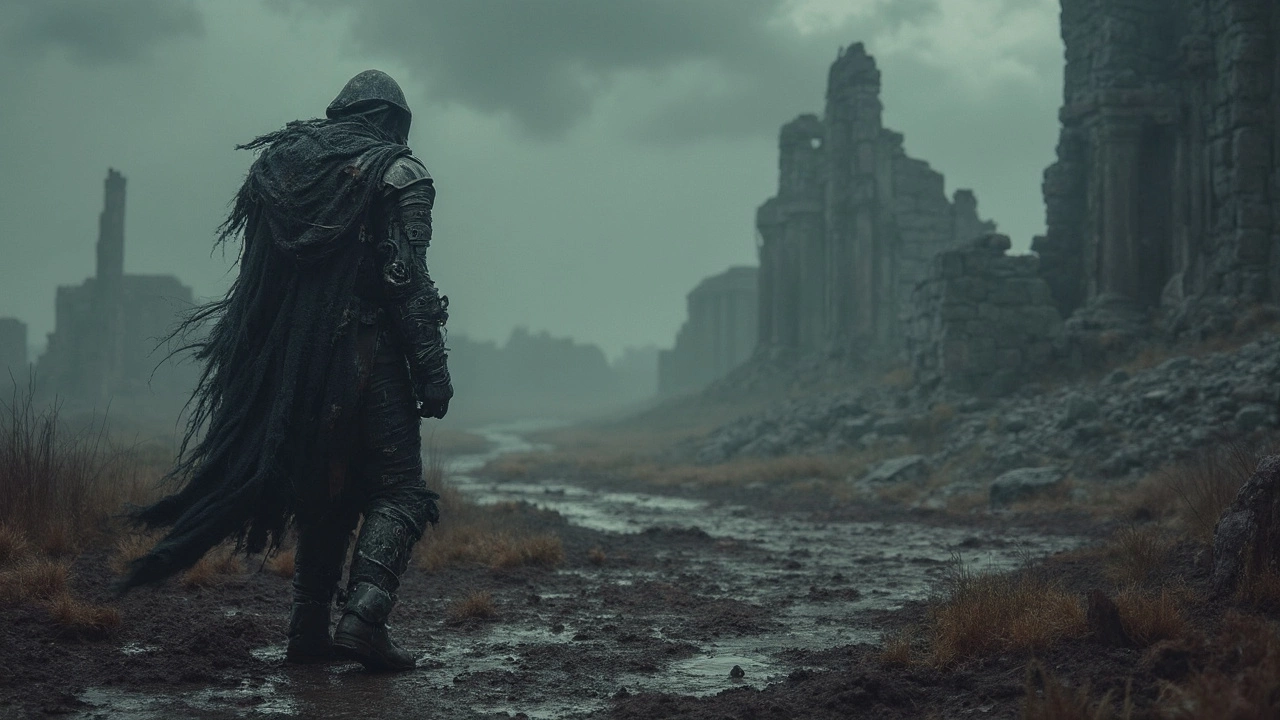Ever heard of grimdark? It's that weirdly enticing corner of the fantasy genre where everything feels a bit more...well, grim. Imagine stories drenched in shades of gray, where heroes aren’t always heroic and the world isn’t wrapped in a fairy tale ending. That's grimdark for you.
The term itself is relatively new, popping up only in recent decades. But don't let that fool you. These stories have some depth, brooding over more than just swords and sorcery. Grimdark tales pull no punches in showing the harsher side of life, sometimes making you squirm in your seat. It's like the fantasy equivalent of a gritty crime drama.
What draws so many readers to these bleak worlds? It might be the raw honesty. No sugar-coating here. Characters are complex and flawed, just like real people. And the moral dilemmas? Oh boy, they're as thick as a foggy night in London. You might even find yourself questioning what you’d do in their shoes.
- Grimdark and Its Origins
- Why Readers Love Grimdark
- Grimdark vs. Traditional Fantasy
- Famous Grimdark Authors and Books
- The Impact on Storytelling
- How to Dive into Grimdark
Grimdark and Its Origins
Grimdark is one of those terms that sneaks into conversations about fantasy novels without a formal invite. But what is it really? Well, it all boils down to a world view that’s dark and gritty, with a splash of real-world cynicism thrown in for good measure. It's like fantasy took a walk on the wild side and never looked back.
The concept itself isn’t entirely new. Some say it traces back to the 1980s, a time when writers started breaking away from the shiny, happy fantasy stories of yesteryears. Think of Warhammer 40k. Its tagline, 'In the grim darkness of the far future, there is only war,' pretty much says it all. It captured that essence of grim reality and kind of stuck. Thus, grimdark was born.
Authors like George R.R. Martin with his A Song of Ice and Fire series also played a huge role in popularizing the genre. Martin's work showed that fantasy didn’t have to be all knights in shining armor; instead, it could reflect the harsh struggles and imperfections of real life. From then on, more authors followed suit, drawn to the appeal of sharing stories laden with moral ambiguity and realistic stakes.
So, why did grimdark take off? Maybe it’s because readers wanted something that mirrored reality a bit more closely, even in a magical world. After all, who doesn't like a touch of realism with their dragons?
Why Readers Love Grimdark
What’s the deal with grimdark, you ask? It’s all about the depth and realness it brings to fantasy novels. People are drawn to stories that don’t shy away from showing life's gritty reality. Here, the bad guys aren’t always purely evil, and the good guys aren’t squeaky clean either. It's like life, but with dragons and magic tossed in for good measure.
This appeal stems from the moral complexities that these stories dive into. Unlike traditional fantasy, where the hero and villain roles are clear-cut, grimdark thrives on ambiguity. You end up questioning who’s right and who’s wrong, making the read not just engaging but also thought-provoking. A bit of moral ambiguity keeps you hooked, since it mirrors the complexities we face in real life.
On top of that, the settings are usually immersive and richly detailed. Imagine a world that feels lived in, where history has left scars on both the lands and the people. Readers love the world-building aspect because it creates a universe that's as much a character as the people in it. You don’t just read about this world; you feel like you’re navigating its rough terrain alongside the characters.
Let’s not forget the emotional engagement. Grimdark gives you an adrenaline rush just from following the plot twists, which can be as unpredictable as a rollercoaster. Feeling the stakes at such a high level keeps you glued to the pages, eagerly wondering what disaster awaits next.
Finally, for those who favor a dose of realism even in make-believe settings, grimdark offers just that. It’s a safe way to explore darker themes and dilemmas while being cushioned by the safety of fiction. Who wouldn't want a slice of reality while escaping into a fantasy?
Grimdark vs. Traditional Fantasy
Imagine you're diving into a world of fantasy. What do you see? If it’s traditional fantasy, you might picture shining knights, wise wizards, and epic battles between good and evil. Everything feels like a grand adventure with clear-cut heroes and villains, reminiscent of classics like J.R.R. Tolkien's 'The Lord of the Rings'. You know, where good ultimately triumphs over evil, and courage can conquer all.
Now let’s throw grimdark into the mix. Suddenly, the lines blur. Those knights aren’t as noble, and the battles seem futile. Enter grimdark—a subgenre that turns those bright tales upside down. Here, the world feels murky and unpredictable. Characters aren’t flawless; they wrestle with their demons, and sometimes, the bad guys win. George R.R. Martin’s 'A Song of Ice and Fire' series is a prime example where motivations are complex and loyalty's just a coin toss away from betrayal.
The difference boils down to outlook and tone. Traditional fantasy often nurtures a sense of hope and heroism. It's like a comforting bedtime story where you know things will work out in the end. In grimdark, though, the narrative won't promise you a safe landing. It challenges that comforting notion, hammering home the idea that the real world (even a fictional one) doesn’t always offer a silver lining.
Take the world-building, for instance. In traditional tales, lands are mystical and awe-inspiring, reflecting a world you’d love to escape to. But in grimdark, environments are harsh, echoing the brutal realities within the storyline. Think of Joe Abercrombie's 'The First Law' series, where the landscape is as unforgiving as its inhabitants.
The appeal of grimdark lies in its relatability. While traditional fantasy provides an escape, grimdark offers a mirror, reflecting the complexities of reality. Readers sometimes crave that raw reflection, a story that dares to shake them from their comfort zones.
Both styles have their place, offering unique windows through which we can view the world around us (or worlds beyond). Whether you're in the mood for a hopeful escape or a gritty exploration of the human condition, knowing the vibe each genre delivers can better shape your next reading choice.

Famous Grimdark Authors and Books
If you're new to grimdark or just want to dive deeper into this gritty subgenre, knowing the key players and their groundbreaking works can be a great start. These authors have crafted tales that not only entertain but also challenge traditional notions of heroism and morality.
Let's kick things off with George R.R. Martin, the mastermind behind 'A Song of Ice and Fire'. You might know it better as the source material for the TV hit 'Game of Thrones'. His knack for intertwining political intrigue with brutal realities makes his work a cornerstone in fantasy novels, especially in the dark fantasy camp.
Then there's Joe Abercrombie, often hailed as one of the frontrunners of modern grimdark. His 'First Law' series is filled with morally complex characters, where even the heroes have tainted pasts. Abercrombie's clever dialogue and dark wit ensure his books are as engaging as they are unsettling.
Mark Lawrence is another name you shouldn't miss. His 'Broken Empire' trilogy begins with 'Prince of Thorns', where he introduces us to Jorg Ancrath, a character whose journey through darkness is as personal as it is epic. Lawrence’s writing is lyrical, but make no mistake: the subject matter is as dark as they come.
The list wouldn't be complete without mentioning Glen Cook and his 'The Black Company' series. This series stands out for its portrayal of a mercenary company's view of the endless wars they fight in. Cook’s pragmatic storytelling emphases realism and moral ambiguity, signatures of the grimdark genre.
These authors have shaped the landscape of grimdark fantasy novels. Their creations offer a thrilling escape into worlds where every decision is fraught with consequence, making them must-reads for anyone eager to explore the darker side of fantasy.
The Impact on Storytelling
Grimdark has shaken things up in the world of fantasy novels, offering a fresh take on traditional storytelling. Instead of painting everything in black and white, this subgenre adds a splash of gray, reflecting the complexities of real life. No more are heroes just noble knights, and villains aren't simply evil overlords. They're real people, with real problems, making grimdark feel much more relatable and, let's be honest, kind of addictive.
One of the biggest impacts has been the shift in character development. Grimdark tends to give readers flawed characters who might not make all the right choices. These characters struggle, sometimes doing the wrong thing to survive. This unpredictability keeps readers glued to the pages, wondering what the heck will happen next.
Another change is how stories tackle themes like morality and justice. In traditional fantasy, good often triumphs over evil. But in grimdark, it's not so simple. The heroes have dark sides, and the villains might just have a point. This creates a more nuanced narrative where readers are encouraged to think critically about right and wrong.
The worlds built in grimdark stories are also worth mentioning. They're often tough, gritty environments that reflect the challenging nature of the characters' inner battles. These settings add layers to the story, making the stakes feel unbelievably high. Plus, they make for some pretty stunning world-building.
It's no surprise that well-known grimdark authors like George R.R. Martin and Joe Abercrombie have gathered a loyal fan base, flipping fantasy tropes on their heads. Their success has paved the way for other storytellers to push boundaries, creating more raw and edgy narratives. In this way, grimdark has not only enriched the fantasy genre but has also challenged authors to take bold, creative leaps in storytelling.
How to Dive into Grimdark
So, you’re intrigued by the world of grimdark and want to take the plunge? Great choice! Get ready for a ride that’s a bit twisted, but incredibly rewarding.
First off, start with some of the standout authors in the genre. You can't go wrong with George R.R. Martin’s 'A Song of Ice and Fire' series. It's a classic and full of those gritty, unexpected moments that define grimdark. Believe me, you'll be left questioning character motives at every turn.
If you're looking for something a bit different, dive into Joe Abercrombie’s works. Books like 'The Blade Itself' and 'Best Served Cold' are excellent showcases of gritty tales with morally gray characters. Abercrombie has a knack for making you root for characters you might normally despise.
Not sure where to begin? Here's a step-by-step to tackle your entry into grimdark:
- Pick a Starter Book: Begin with a novel by a well-known grimdark author. It's like sampling the starter dish of a new cuisine—sets the stage for what’s to come.
- Go in with an Open Mind: This genre is all about unpredictability. Don’t expect clear-cut heroes and villains. Embrace the complexity.
- Join a Community: Online forums and book clubs often have sections devoted to grimdark. Chat with other readers, share insights, and get recommendations.
- Mix It Up: Try books by different authors to see various takes on the genre. Each author brings a unique flare to grimdark.
One might think that grimdark is about indulging in a bleak outlook, but it’s more about finding the beauty in flaws, both in characters and stories. Don’t forget to take your time and savor the details as you explore these complex worlds.

